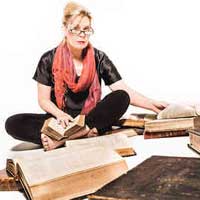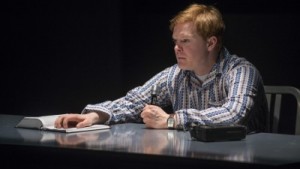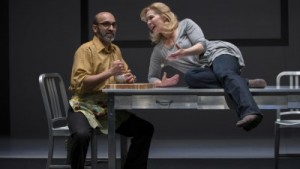
 [rating=4]Court Theatre’s new production, “The Good Book”, is an intriguing play about two wildly disparate people set against more than 3000 years of history. You had to have faith in the playwrights – and wait until the second act – to fill in the blanks. “The Good Book” is a very well-written, well-acted play, and I give it 4 Spotlights.
[rating=4]Court Theatre’s new production, “The Good Book”, is an intriguing play about two wildly disparate people set against more than 3000 years of history. You had to have faith in the playwrights – and wait until the second act – to fill in the blanks. “The Good Book” is a very well-written, well-acted play, and I give it 4 Spotlights.
There is no question that the Bible is the most important book ever written. There is no question that the Bible’s history parallels the history of books. What is up for debate – at least among biblical scholars – who compiled all these myths and legends, and how much was lost in translation.
The historical part of “The Good Book” begins at the beginning, following the people – scribes, copiers, apostles, historians, illuminators, printers, translators – who had an impact on the Bible. Man 1 (Allen Gilmore), Man 2 (Erik Hellman), Man 3 (Kareem Bandealy). Woman 1 (Jacqueline Williams) and Woman 2 (Emjoy Gavino) are kind of a Greek chorus each playing multiple characters both specific and anonymous.
Miriam (Hollis Resnick) is a brilliant Biblical scholar teaching an introductory class in the Bible. She likes to preen while expounding on her theories in class. She encourages her students to ask questions, but this semester, she has a pesky student who believes every word in the Bible challenging her at every turn. At home, she looks forward to her online visits with her significant other, who is on a dig somewhere in the Middle East. 
Back in 1975, Connor (Alex Weisman), who is just turning fifteen, records everything he’s thinking and feeling on his over-the-shoulder tape recorder. He wants to become a priest and he’s rather obsessive about religious rituals. After an unsettling experience with another boy at scout camp, he looks to the Bible for answers.
Connor’s quest intersects with Biblical history. He asks Luke about his Gospel, and by the way, what about Matthew, Mark and John. A blank look from Luke helps him figure out the Gospels haven’t yet been written. He’s no more successful when he asks about all those rules in the Old Testament. The volatile Paul is dictating a letter to a scribe when Connor interrupts to ask about love, faith and the law. When he complains to King James that the Bible is wrong; that stuff was left out, King James tells him to grow up!
One day, Miriam loses her temper in class at her pesky student. Then as she’s driving her significant other to the airport through a snowstorm, he admits he has faith and they break up. On the way home, her car skids and crashes. Suddenly, she’s inside history, watching monks illustrate the Book of Kells. Gutenberg hands her a box of moveable type pieces which he says are all the words he couldn’t fit into his Bible. A modern theological committee is charged with overseeing gender neutrality in the Bible – in other words taking all the sexist language out.
Connor had entirely too much religion, until his church rejected/failed him. Miriam had no religion at all. In the end, both stayed true to who they were. “The Good Book” gives us a lot to think about. In a script filled with profundities, I took one away with me. “Tradition is only useful if it keeps you moving forward.”
“The Good Book” runs through April 19th at the Court Theatre, 5535 S. Ellis Ave., Chicago. Performances are Wednesday and Thursday at 7:30 pm; Friday at 8:00 pm; Saturday at 3:00 and 8:00 pm; Sunday at 2:30 and 7:30 pm. Running time is 2 hours, 50 minutes including a 15 minute intermission. Tickets range from $45-$65. Parking is free in the adjacent garage. FYI (773) 753-4472 or www.courttheatre.org. 
To see what others are saying, visit www.theatreinchicago.com, go to Review Round-up and click at “The Good Book”.
Editors note: Dealing with religion is not always easy. The odds of making everyone in the audience leave the theater feeling good, or at least satisfied, are very low, but with a strong cast, such as this one, it works.






More Stories
“shucked”
“Hitt Records” Reviewed by Julia W. Rath
“The Berlin Diaries” reviewed by Julia W. Rath